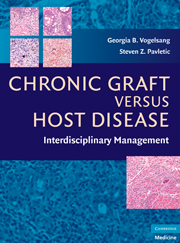Book contents
- Frontmatter
- Contents
- List of Contributors
- Preface
- PART I GENERAL PRINCIPLES
- PART II CLINICAL MANAGEMENT
- PART III ORGAN SITE OR SYSTEM-SPECIFIC MANIFESTATIONS
- 16 Cutaneous Manifestations of Chronic Graft versus Host Disease
- 17 Oral Chronic Graft versus Host Disease
- 18 Chronic Ocular Graft versus Host Disease
- 19 Gynecological Manifestations of Chronic Graft versus Host Disease
- 20 Gastrointestinal and Hepatic Manifestations of Chronic Graft versus Host Disease
- 21 Chronic Graft versus Host Disease and the Lung
- 22 Hematologic Complications of Chronic Graft versus Host Disease
- 23 Neurological Manifestations of Chronic Graft versus Host Disease
- 24 Rehabilitation Evaluation and Treatment of Patients with Chronic Graft versus Host Disease
- 25 Infections
- 26 Endocrine and Metabolic Effects of Chronic Graft versus Host Disease
- 27 Other Manifestations of Chronic Graft versus Host Disease
- 28 Psychosocial Issues in Chronic Graft versus Host Disease
- 29 Secondary Malignancies and Other Late Effects
- 30 Health-Related Quality of Life (HRQOL) in Chronic Graft versus Host Disease
- PART IV SPECIAL CONSIDERATIONS IN CHRONIC GVHD
- Index
- Plate section
30 - Health-Related Quality of Life (HRQOL) in Chronic Graft versus Host Disease
from PART III - ORGAN SITE OR SYSTEM-SPECIFIC MANIFESTATIONS
Published online by Cambridge University Press: 26 August 2009
- Frontmatter
- Contents
- List of Contributors
- Preface
- PART I GENERAL PRINCIPLES
- PART II CLINICAL MANAGEMENT
- PART III ORGAN SITE OR SYSTEM-SPECIFIC MANIFESTATIONS
- 16 Cutaneous Manifestations of Chronic Graft versus Host Disease
- 17 Oral Chronic Graft versus Host Disease
- 18 Chronic Ocular Graft versus Host Disease
- 19 Gynecological Manifestations of Chronic Graft versus Host Disease
- 20 Gastrointestinal and Hepatic Manifestations of Chronic Graft versus Host Disease
- 21 Chronic Graft versus Host Disease and the Lung
- 22 Hematologic Complications of Chronic Graft versus Host Disease
- 23 Neurological Manifestations of Chronic Graft versus Host Disease
- 24 Rehabilitation Evaluation and Treatment of Patients with Chronic Graft versus Host Disease
- 25 Infections
- 26 Endocrine and Metabolic Effects of Chronic Graft versus Host Disease
- 27 Other Manifestations of Chronic Graft versus Host Disease
- 28 Psychosocial Issues in Chronic Graft versus Host Disease
- 29 Secondary Malignancies and Other Late Effects
- 30 Health-Related Quality of Life (HRQOL) in Chronic Graft versus Host Disease
- PART IV SPECIAL CONSIDERATIONS IN CHRONIC GVHD
- Index
- Plate section
Summary
INTRODUCTION AND BACKGROUND
General studies of the late effects in survivors of allogeneic hematopoietic stem cell transplantation (HSCT) suggest that chronic gra-ft versus host disease (cGVHD) has deleterious consequences for physical, mental, and social aspects of functioning and for health-related quality of life (HRQOL). These studies' findings imply that following allogeneic HSCT, cGVHD negatively affects physical function, domestic and vocational role function, marital, family and social interaction, and psychosocial recovery, and may be associated with a number of bothersome symptoms including fatigue, depression, pain, bowel changes, and dyspareunia. Systematic prospective, longitudinal evaluation of HRQOL using standardized measures is needed, of new treatment approaches and to gain a better understanding of the overall impact of cGVHD on general physical and mental health, functioning, symptom burden, and well-being, and to gauge the effectiveness of new treatment approaches. Over the past several years, both the National Institutes of Health/National Cancer Institute and the U.S. Food and Drug Administration have been increasingly interested in understanding how patient-reported outcomes (PROs) (symptoms, functional performance and quality of life) should be incorporated as enpoints into trials of new therapies, and how PROs can be used to evaluate therapeutic response in cGVHD.
- Type
- Chapter
- Information
- Chronic Graft Versus Host DiseaseInterdisciplinary Management, pp. 335 - 348Publisher: Cambridge University PressPrint publication year: 2009
- 2
- Cited by



